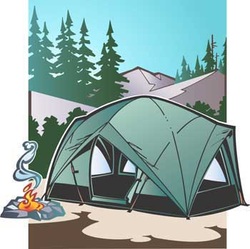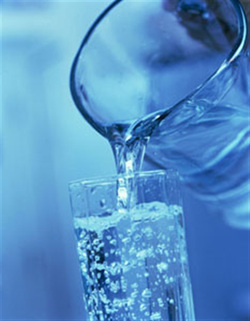 I love the outdoors. Sunlight, fresh air, plants, trees, animals...just thinking about it and I start to yearn for it! I live in the city with far too many cars, people and not enough nature. So every now and then I strip myself of this "civilized" life and go camping. All out camping - tents, fires, digging a hole when you need one - just nature and silence. Camping brings memories and visions of s'mores and hotdogs. When I changed my diet and became a raw vegan nearly five years ago, I had to shift the way that I thought about camping. The food that I eat now, that brings health and healing, goes where I go. The great thing about camping is that you don't necessarily sit down for three square meals a day. Usually it's quite a lot of snacking - which is precisely how I eat as a raw vegan. Frequent little nuggets of energy to refuel all day long. I do camp with others (who are not raw vegan) so I'll need to have a few options that would feel meal-like. The fun thing about being me? I'm not ridiculously strict about it all. I've learn to loosen the reins and allow myself room to breathe. I don't dry my own spices, I use small amounts of processed food (like soy sauce or toasted sesame oil) for flavorings. And sometimes I enjoy some portobellos mushrooms while camping....grilled. GASP! On my list to snack on: apples, oranges, bananas, grapes, blueberries, dried figs, raisins, raw nuts, dehydrated cheezy crackers, almond butter, and some strawberry fruit leather I made. On my list to enjoy as a sit down meal (a.k.a. social time): Salad fixings - lettuce, tomato, cucumber, bell pepper, avocados, vinegar, seasonings, olive oil. Portobello Mushrooms and Yams (to grill! woah!), and my Lemon Ginger Lettuce Rolls. For my kids (who are about 80% raw): all the fruit I have...they could easily become fruitarian, I think, dry healthy-ish cheerios, packaged applesauce, and tortillas with ham and cheeze. I'll eat when I'm hungry (which is pretty much all the time - some things never change), and I have a few things up my sleeve for when we gather as a group around the fire. Oh, and did I mention water and smoothies? I will make 128 ounces of Green Smoothies to take with us to enjoy in the morning as breakfast. Sometimes I take my Vitamix if we will be gone a long time. If it's only for a few days - I premake and take them along. So there you have it. Easy, peasy, raw pumpkin pie. A little forethought with dehydrating, but most of my food is fresh fruits and vegetables. Delicious, fun, energy-producing, and easy. My new motto was given to me by a Marine that I'm coaching to eat healthier: "Adapt, Improvise, Conquer." That's how I help people get healthier and how I live my life. :)
3 Comments
The 31 days of raw honeymoon is all over. Oh no!! Now what do I blog about? =P I need questions, inspiration, ideas, please!!!! Someone asked me a few months ago about retaining water. I did some research and found almost every source saying the same thing. Since I found someone who said it very well, I'll just quote him. This is Jeremy Likness from his book, "Lose Fat, Not Faith.":  Women around the world are constantly dealing with the bloating, or retention of water in their bodies. It causes clothes to not fit correctly and is great annoyance that affects both comfort and self-esteem. So is there anything natural a woman can do to help offset a bout of this unpredictable hormonal nuisance? YES! First, it helps to understand what causes the body to retain water. Water helps your liver convert fat into usable energy. If you don't drink enough water, your kidneys are overwhelmed with concentrated fluids, and they will make your liver do extra work. Your liver works hard to turn your body fat into the energy that you use but if it has to do the kidney's work, then it simply hold onto the extra fat that would have been burned off if you simply had enough water. And what's worse is that instead of excreting water and waste products, you body retains existing water to reuse. This is what causes water retention and bloating. When you don't get enough water, your body panics and holds on to it selfishly, as though you're in a famine. The best way to get rid of this water retention is to drink enough of it to return your body and its processes back to a normal equilibrium. You'll also feel thirsty more often, and this will start a healthy cycle of thirst leading to hydration. But you have to keep it up because if you stop drinking enough water, all the good things you've gained from drinking water (balanced body fluids, weight loss, decreased hunger and thirst) will reverse back to the way they were. In the human body, water lubricates joints and organs. It maintains muscle tone. Water keeps skin soft. Water regulates body temperature, filters out impurities, and keeps the brain working properly. Water transports nutrients to and from cells. While the human body can store energy as glycogen, fat, and tissue, it cannot "store" water - the body uses its own water but expects us to provide a continuous supply of fresh new water regularly to function. Water is critical in moving nutrients into and out of a cell, an action known as the "ion pump". When you take in the improper balance of sodium and potassium or do not drink adequate water, your body will increase a hormone and try to "retain" water by keeping your kidneys from filtering it. Ironically, one of the best ways to stop retaining water is to drink more water! While humans can survive without food for several weeks (documented cases have shown lengths of up to two months), we can only survive a few days without water. Thirst is a signal that your body needs to be re-hydrated, but by the time you are thirsty it's already too late. Just a fraction of a percentage drop of your body's water supply can result into huge performance decreases. Even slight dehydration can be critical. In the recent sports season, a few deaths resulted from dehydration. Contrary to popular belief, "chugging" a gallon of water is not going to provide your body with the water it needs. When too much water floods your system at once, your body will pass most of it on to your bladder, and only absorb a slight amount. Weight in the stomach is a signal for digestive processes to begin, and a number of biological chemicals enter your stomach and change the pH balance. This can result in indigestion and stomach pain. The best way to take water is to steadily sip it throughout the day. You should also eat plenty of fruits and vegetables - most of the produce you eat is filled with water, and the body can process this water very efficiently. So - how much water? There are a million theories and equations. We've been told to drink "eight cups a day," which is better than nothing, but should every adult require this same amount of water when people come in a wide variety of sizes, shapes and have different metabolisms and exercise habits? Then there is the complicated equation that involves computing your basal metabolic rate and energy expenditure. We had to throw that one out, too - who wants to run a computer program every day just to figure out their water needs? Most people would just prefer to drink like a fish and then be done with it. Just kidding. Actually there are two ways to compute water intake and both work incredibly well. The first is a little too vague for some people to follow, but very effective - it is recommended by nutritionist Will Brink. Will says to drink enough water to have two or three absolutely clear urinations per day. If you do not have these clear urinations, then either you are not drinking enough water, are not eating healthily or have some type of infection or other illness. For a normal, healthy adult, two or three clear urinations are a great "ruler." If you do not have these, then increase your water intake until it happens. If that is a little too general or explicit for you, another way is to take your weight and divide it in half. This is a "baseline" amount of ounces to drink every day. For every cup that you drink that is not water, drink a cup that is water. For every bout of exercise, drink a cup before and after, and one extra cup for every hour that you exercised (round up!). That's it. Let's use an example. If you weighed in at 200 pounds, 200 / 2 = 100 ounces of water, or about 12 cups. Let's say you also ran on the treadmill for 30 minutes. One cup before, one cup for the exercise, and one cup after is three cups total. 12 + 3 = 15 cups. You also drank two cups of coffee, so you should have two extra cups of water. 15 + 2 = 17. That's it - today's optimal water consumption for you is 17 cups! The type of water to drink is also the subject of much debate. Filtered tap water is better because of the potential for harmful agents in "raw" tap water. Keep in mind that if you drink too much non-filtered water, you may increase your chances of acquiring kidney stones if there are many foreign materials that your body has to filter out. When you look at a water filter before you toss it out, that is exactly what your body's filter - the kidneys - would have had to process as well. Reverse osmosis water filtration is probably the best option. |
About the BloggerHaley is passionate about Raw Food and how God has used it to heal her. She loves to share what she knows with anyone who is curious, and finds herself talking to everyone around her about her lifestyle. Archives
January 2020
Categories
All
|

 RSS Feed
RSS Feed